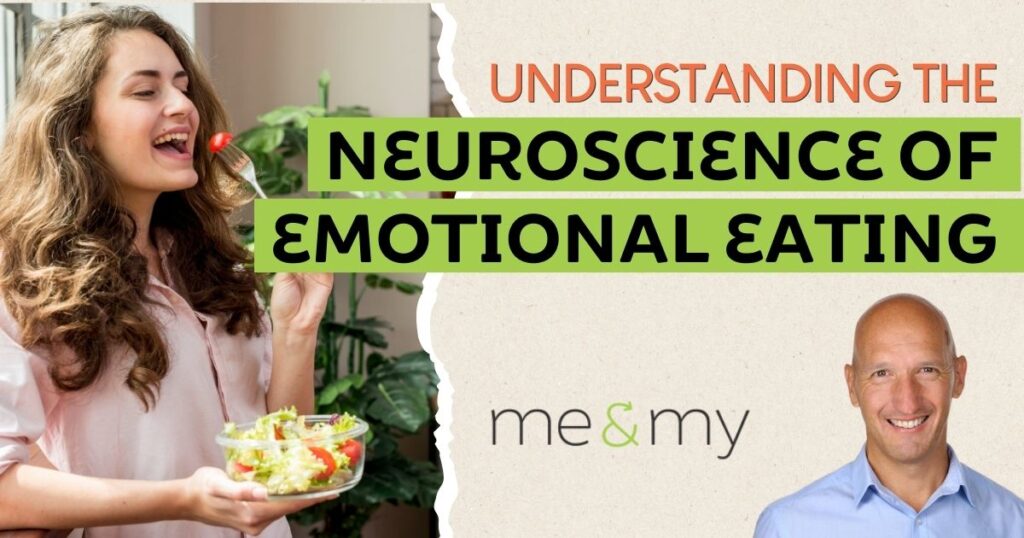Decoding the Cravings: Understanding the Neuroscience of Emotional Eating

Emotional eating. We’ve all been there. Stressful day at work? Reach for the ice cream. Feeling down? Comfort yourself with a tub of cookies. But what’s really going on in our brains when our emotions drive us to overindulge?
This episode of the me&my health up podcast delves into the fascinating world of neuroscience to shed light on the complex relationship between our emotions and our eating habits. Here, we’ll explore the key takeaways and equip you with practical strategies to overcome emotional eating and reclaim control of your health.
watch the full video of the episode here:
The Craving Cycle: From Boredom to Biscuit Bliss
Our brains are wired to seek pleasure and avoid pain. When we experience negative emotions like stress, sadness, or loneliness, the limbic system (our emotional center) triggers the release of stress hormones like cortisol.
These hormones can disrupt our brain’s reward system, leading to decreased levels of dopamine and serotonin, neurotransmitters associated with happiness and contentment.
To compensate for this dip in feel-good chemicals, we might crave foods high in sugar, fat, and salt. These “comfort foods” trigger a temporary surge in dopamine, providing a fleeting sense of pleasure and relief.
However, this is followed by a crash in energy and potential feelings of guilt or shame, perpetuating the cycle of emotional eating.
Beyond the Bite: Negative Thinking Fuels the Fire

It’s not just our emotions that drive us to eat our feelings. Our thought patterns play a significant role as well. Negative self-talk and rumination on stressful events can further intensify emotional distress and exacerbate cravings.
The podcast highlights the concept of “confirmation bias,” where we tend to focus on negative information while ignoring positive aspects of a situation. This negativity bias can fuel emotional eating as a way to numb or suppress uncomfortable feelings.
Breaking Free: Strategies for Mindful Eating and Emotional Regulation

The good news is that we’re not powerless in the face of emotional eating. By understanding the neuroscience behind our cravings and developing healthier coping mechanisms, we can break free from this cycle and build a more positive relationship with food.
Here are some key strategies discussed in the podcast:
1. Identify Your Triggers
The first step is to become aware of the situations, emotions, or thoughts that typically trigger your emotional eating. Are you more likely to reach for unhealthy snacks when stressed at work, bored in the evenings, or feeling lonely? Recognizing your triggers is crucial for developing alternative coping strategies.
2. Seek Fulfilment Internally
Instead of turning to food for comfort, seek meaningful activities that bring you genuine fulfilment and joy. This could involve spending time with loved ones, pursuing hobbies, engaging in physical activity, or practising mindfulness techniques like meditation.
3. Challenge Negative Thinking
When negative thoughts arise, don’t just accept them as truth. Challenge them by asking yourself if they are accurate and helpful. Look for evidence to the contrary and practice reframing negative thoughts into more positive and empowering ones.
4. Develop Healthy Coping Mechanisms
Identify healthy ways to manage stress, boredom, and other negative emotions. This could include exercise, journaling, spending time in nature, listening to music, or practising relaxation techniques like deep breathing.
5. Practise Mindful Eating
Pay attention to your body’s hunger and fullness cues, and eat slowly and savour your food. Avoid distractions while eating and focus on the experience of nourishment rather than mindlessly consuming calories.
6. Balance Your Perceptions
When experiencing negative emotions, ask yourself the question “How is this serving me?” This helps to reframe the situation and identify any potential benefits or learnings from the experience. This can help to neutralise the negative emotion and bring you back to a more rational state of mind.
Remember, change takes time and effort. Be patient with yourself and celebrate your progress along the way. By incorporating these strategies into your daily life, you can gain control over your emotional eating and build a healthier, happier relationship with food.
Additional Tips:

- Seek professional help: If you’re struggling with emotional eating and feel unable to manage it on your own, consider seeking professional help from a therapist or registered dietitian. They can provide personalised guidance and support to help you develop healthy coping mechanisms and achieve your goals.
- Join a support group: Connecting with others who understand your struggles can be a source of encouragement and motivation. Look for online or in-person support groups focused on emotional eating or mindful eating.
- Educate yourself: Continue to learn more about the neuroscience of emotional eating and healthy eating habits. There are many excellent resources available online and in libraries, including books, articles, and podcasts.
By taking charge of your emotional well-being and developing healthier coping mechanisms, you can break free from the cycle of emotional eating and create a more positive and fulfilling relationship with food. Remember, you are not alone in this journey, and there are many resources available to support you on your path to a healthier and happier you.
Join the me&my health up club!
For further insights, community support, and exclusive resources on emotional eating, mindfulness, and holistic well-being, join the me&my health up club. Together, we can empower ourselves to make informed choices and achieve optimal health and happiness.
Empowering Your Journey: Holistic Health Coaching for Emotional Balance
Understanding the neuroscience of emotional eating is a powerful first step, but translating knowledge into lasting change can be challenging. At me&my wellness, our holistic health coaches provide personalised guidance and support to help you navigate your unique journey towards emotional well-being.
Ready to take control and create lasting change? Book a 15-minute FREE consultation with us today and embark on your path to a healthier, happier you.

